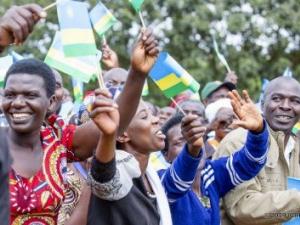
What to expect from newly created Ministry of National Unity and Civic Engagement
Dr. Jean Damascène Bizimana was sworn-in yesterday to head the newly created Ministry of National Unity and Civic Engagement.
Dr. Bizimana who previously served as the Executive Secretary of the National Commission for the Fight Against Genocide (CNLG) was named Minister of National Unity and Civic Engagement on 31st August following the creation of the Ministry on 14th July 2021.
Speaking to the media after the swearing-in ceremony, Dr. Bizimana explained that the Government has been determining the functioning and responsibilities of the Ministry since its creation.
“The Ministry had not yet started but there have been preparations since creation taking into consideration its functioning, mandate and structure. So far, preparations are on good progress where some key areas of responsibilities have been determined. One of them is the responsibility to develop policies related to unity and civic education,” he said.
“The Ministry will also oversee the implementation of the policies. Normally, some ministries design policies to be implemented by affiliated institutions but our Ministry will have the mandate to draft policies and implement them,” added Dr. Bizimana.
He revealed that developed policies will be implemented in partnership with relevant stakeholders including non-governmental organizations, religious denominations among others.
The Ministry is expected to focus on national unity, historical memory and citizenship education.
It will also merge duties of CNLG and the National Unity and Reconciliation Commission (NURC).
Previously, the National Itorero Commission (NIC) was responsible for civic education related programs.
Speaking to RBA, Dr. Bizimana explained that an assessment will be conducted to determine the next course of actions for institutions that previously assumed responsibilities transferred to the Ministry of National Unity and Civic Engagement (MNUCE).
“The most important thing is to identify institutions with track records in terms of fighting Genocide and related ideology, promoting Rwandans unity and instilling values of Rwandan culture among others. There are apparent achievements,” he noted.
“It however requires to beef up efforts along the merger process and bridge the gap in some areas,” added Dr. Bizimana.
MNUCE is formed at a time when different reports show that Rwandans have made a step further to live in harmony without ethnic discrimination which characterized them in the past.
The 5th Reconciliation Barometer released by NURC in 2020 indicated that reconciliation among Rwandans stands at 94.7 percent from 92.5 in 2015.
The report also shows that the percentage of citizens perceiving themselves as Rwandans instead of basing on ethnic lines increased from 95.6 per cent in 2015 to 98.2 per cent in 2020.
Among others, Minister Bizimana revealed that the new entity will also put emphasis on preserving Rwanda’s history and assess its impact on unity and reconciliation among Rwandans.
The Ministry is also expected to play a major role in consolidating achievements attained over the past 27 years in unity and reconciliation as well as preventing Genocide ideology among others.
The newly created entity becomes Rwanda’s 20th ministry.
http://en.igihe.com/news/article/what-to-expect-from-newly-created-minis...
